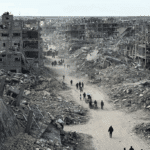Kindu, Democratic Republic of the Congo (DR Congo) – Avocats Sans Frontières (ASF) welcomes the conviction of a senior commissioner of the Congolese National Police (PNC) for crimes against humanity. In its ruling on 31 October 2015, the Military Court of Kindu sentenced Colonel Amuri Pia Abraham to 15 years in prison for the rapes, torture and imprisonments carried out by his men in several villages in May 2012. This decision, the first conviction of its kind in the province of Maniema, demonstrates the commitment of the Congolese judicial system to continue the fight against the impunity of perpetrators of crimes against humanity in the DRC.
In May 2012, following a customary power struggle between two groups in the territory of Kibombo, in the province of Maniema, a group of around thirty police officers under the command of the senior commissioner of the PNC, Amuri Pia Abraham, was sent to the village of Dembo to restore public order. When he arrived at the scene, the police commander sided with the leader of one of the two feuding groups. His men then engaged in various crimes against humanity, such as looting, rape and torture, against members of the other group.
At the end of a trial full of twists and turns, the senior police commissioner was found guilty by the Military Court of Kindu of the crimes committed by his men in Dembo and several surrounding villages.
The change in strategy during the trial by the prosecution, which had tried to minimise the seriousness of the facts by pointing out that no villager had been killed, led some in civil society to consider the possibility that pressure had been put on the prosecution by people close to the colonel.
The Court sentenced the defendant to 15 years in prison but also to pay damages to 75 victims, jointly and severally with the State. According to Innocent Cokola, ASF Project Assistant for International Justice in the DR Congo, “by handing down a more severe sentence than that required by the public prosecution, the Court has reaffirmed its independence.”
This case is crucial insofar as it is the first conviction of its kind in the province of Maniema, with the facts of the case having occurred in remote villages and outside areas under the supervision of the international community. “This sentence therefore demonstrates the will of the Congolese judicial system to continue to fight against the impunity of the perpetrators of crimes against humanity, even in the highest echelons of the armed forces and in the most inaccessible areas of the country,” notes Dominique Kamuandu, International Justice Coordinator for ASF in the DR Congo. “It therefore sends a signal to those who would repeat the acts committed by the convicted colonel”.
Civil society organisations (CSOs) who took part in the trial have called for vigilance in relation to the risk of the convicted offender escaping, as well as to the security risks to which they themselves are exposed. ASF continues to be concerned about these risks and invites the authorities to take all necessary measures to ensure that the convicted offender actually serves his sentence and to guarantee the safety of these CSOs and also of the victims. ASF also hopes that the process of paying the reparations will be carried out efficiently.
ASF has had a presence in RD Congo since 2002 and facilitated the participation in this trial of 79 people, 75 of who will benefit from these financial reparations.
Cover picture: A victim (with hood) appears before the Court together with the accused (standing left). This situation is due to the lack of appropriate justice infrastructure. Dembo trial, Kindu, Maniema Province, DR Congo, October 2015 © ASF/I. Cokola



